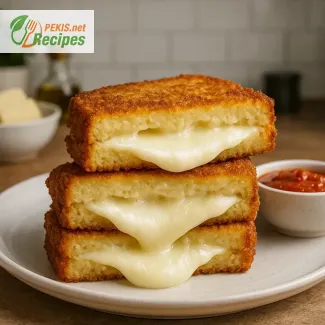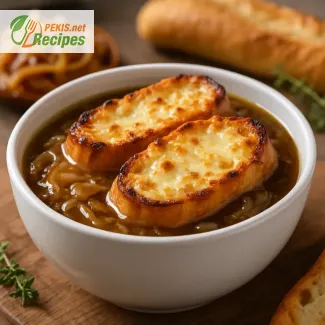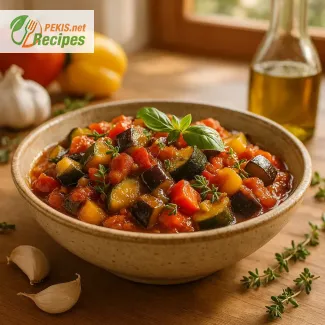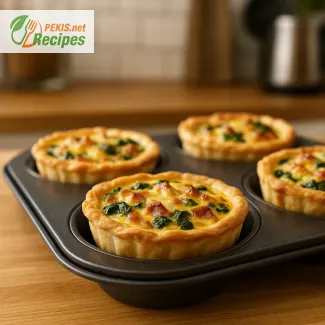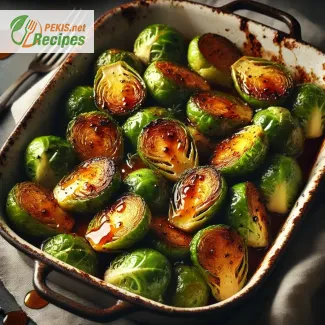
Baked Brussels sprouts with honey and balsamic vinegar create a deliciously rich and caramelized flavor profile that’s both sweet and tangy—a true delight for the senses. This dish transforms the sometimes-polarizing Brussels sprout into a must-try favorite, thanks to the perfect blend of honey, balsamic vinegar, and the natural caramelization that happens during roasting. As these miniature cabbages bake, their outer leaves become beautifully crispy, while the insides remain tender, offering a wonderful contrast in texture.
The combination of honey and balsamic vinegar elevates the Brussels sprouts, adding layers of complexity and richness that make them ideal for holiday meals, special gatherings, or simply as an elevated side dish for weeknight dinners. The honey brings a gentle sweetness that balances the slightly bitter notes of the Brussels sprouts, while the balsamic vinegar adds an earthy depth and a hint of acidity, creating a delicate harmony that appeals to both seasoned and new fans of this vegetable.
Roasting at a high temperature is key to achieving the desired caramelization, allowing the honey and balsamic vinegar to form a sticky glaze that coats each sprout, enhancing their natural flavors and imparting a golden-brown finish that’s as visually appealing as it is delicious. As the honey and balsamic vinegar reduce in the oven, they intensify, offering a rich, velvety coating that’s deeply satisfying. This process of roasting, paired with a touch of olive oil and salt for seasoning, ensures that every bite delivers a burst of flavor with both a crisp and tender texture.
Not only is this dish a pleasure for the taste buds, but it’s also packed with nutritional benefits. Brussels sprouts are high in fiber, vitamins C and K, and antioxidants, supporting immune health and overall wellness. Honey adds a touch of natural sweetness without refined sugar, while balsamic vinegar is known for its antioxidant properties and potential benefits for digestive health. Together, these ingredients make this dish a guilt-free indulgence that’s as nourishing as it is tasty.
For anyone looking to add a bit of gourmet flair to their meals, this dish is the answer. Whether served as a side with roasted meats, incorporated into grain bowls, or enjoyed on their own, baked Brussels sprouts with honey and balsamic vinegar are versatile, simple to prepare, and highly adaptable. Consider pairing this dish with a sprinkle of toasted nuts like almonds or walnuts for added crunch, or a dash of fresh herbs such as thyme or rosemary for an extra layer of fragrance and flavor. This elegant side is sure to impress at any occasion, capturing the essence of comfort and sophistication in every bite.
With minimal effort and maximum flavor, these caramelized Brussels sprouts will soon become a staple for anyone who appreciates the art of elevating simple ingredients into a culinary masterpiece. For those exploring ways to add variety to their vegetable repertoire, this dish is a wonderful introduction to the world of bold, balanced flavors that highlight the beauty of seasonal produce.
- Preheat the Oven
Preheat your oven to 200°C (392°F) to ensure even roasting. - Prepare the Brussels Sprouts
Wash and dry the Brussels sprouts thoroughly. Trim the stem ends and remove any yellowed or damaged outer leaves. Cut each sprout in half lengthwise for even roasting and caramelization. - Season and Coat
In a large mixing bowl, combine the Brussels sprouts with olive oil, salt, and black pepper. Toss until each sprout is evenly coated with the oil and seasoning. - Arrange on Baking Sheet
Spread the seasoned Brussels sprouts in a single layer on a baking sheet lined with parchment paper. Make sure there’s enough space between them to allow for proper browning. - Bake the Brussels Sprouts
Place the baking sheet in the preheated oven and roast the sprouts for 15 minutes. Stir them halfway through to ensure they roast evenly and get crispy edges. - Add Honey and Balsamic Glaze
In a small bowl, mix honey and balsamic vinegar until well combined. After the initial roasting, remove the Brussels sprouts from the oven and drizzle the honey-balsamic mixture over them. Toss gently to coat the sprouts evenly. - Finish Roasting
Return the baking sheet to the oven and roast for an additional 10 minutes or until the Brussels sprouts are deeply caramelized and tender on the inside with a golden-brown exterior. - Serve
Transfer the caramelized Brussels sprouts to a serving platter. Optionally, garnish with a sprinkle of toasted nuts or fresh herbs for added texture and aroma.
Creating the perfect Baked Brussels Sprouts with Honey and Balsamic Vinegar comes down to balancing flavors, enhancing textures, and adjusting cooking techniques to suit your preferences. Here are some expert tips to elevate this recipe and bring out even more depth, flavor, and versatility.
1. Selecting the Freshest Ingredients
- Brussels Sprouts: Look for Brussels sprouts that are firm, bright green, and free from yellowed or wilted leaves. The fresher the sprouts, the sweeter and less bitter they’ll taste when roasted. If possible, select smaller sprouts as they tend to be more tender and have a milder flavor.
- Balsamic Vinegar: Quality matters. Aged balsamic vinegar is often thicker and sweeter, lending a richer, deeper flavor to the dish. If available, consider using a balsamic reduction or a premium aged balsamic for added complexity. If you prefer a lighter tang, go for a less aged, more acidic variety.
- Honey: For the best results, use pure, raw honey. The natural enzymes and subtle flavors of raw honey create a more nuanced sweetness. For added dimension, try flavored honeys like wildflower or acacia honey, which can contribute unique floral or fruity undertones.
2. Enhancing the Flavor Profile
- Herbs and Aromatics: Brussels sprouts pair well with fresh herbs such as rosemary, thyme, or sage. Adding a sprinkle of fresh thyme or rosemary before roasting infuses the dish with a fragrant, earthy aroma. Alternatively, add a hint of garlic powder or thinly sliced fresh garlic to give a savory depth.
- Sweetness Variation: For those who prefer less sweetness, reduce the honey slightly or use maple syrup as an alternative, which adds a more subtle, woody sweetness that complements the balsamic vinegar. For extra flavor complexity, a dash of apple cider vinegar mixed with honey can offer a fruity, tart sweetness that enhances the caramelized sprouts.
3. Achieving Perfect Texture
- Optimal Roasting Technique: To achieve a crispy exterior and tender interior, it’s crucial to roast Brussels sprouts at a high temperature. Set your oven to 200-220°C (392-428°F) and avoid crowding the pan. When Brussels sprouts are too close together, they release moisture and steam, preventing them from getting crispy. Arrange them in a single layer with ample space to encourage even browning.
- Crispier Finish: For an extra-crispy finish, consider tossing the sprouts in a small amount of cornstarch or fine breadcrumbs before adding the oil. This thin coating helps absorb moisture, making the exterior crispier when roasted.
- Preheating the Baking Sheet: Placing the Brussels sprouts on a preheated baking sheet can accelerate the caramelization process and create a quicker, crisper finish. Preheat the sheet in the oven for 5-10 minutes before arranging the seasoned sprouts on it.
4. Experimenting with Toppings and Garnishes
- Toasted Nuts and Seeds: To add texture and nutty richness, sprinkle toasted almonds, walnuts, or sunflower seeds over the Brussels sprouts just before serving. Toasted nuts bring a delightful crunch and also add heart-healthy fats to the dish.
- Dried Fruits: Add a touch of natural sweetness by incorporating dried cranberries, raisins, or chopped dried apricots. These dried fruits provide a chewy contrast to the crispy Brussels sprouts and pair well with the balsamic glaze, creating a beautiful balance of sweet and savory.
- Parmesan or Cheese Crumbles: For an indulgent twist, sprinkle freshly grated Parmesan cheese or crumbled feta over the sprouts immediately after roasting. The slight saltiness of these cheeses enhances the savory-sweet flavors, and Parmesan’s nuttiness complements the honey and balsamic perfectly.
5. Adjusting for Dietary Needs
- Vegan Substitution: To make this dish vegan, replace honey with maple syrup or agave nectar. Both options provide a similar sweetness without any animal-derived ingredients. Maple syrup in particular has a robust, woody taste that enhances the earthy flavor of the Brussels sprouts.
- Gluten-Free Option: This recipe is naturally gluten-free. However, if adding toppings like breadcrumbs for extra crunch, ensure they are gluten-free or use crushed rice crackers or gluten-free panko as a substitute.
- Lowering Sugar Content: For those watching sugar intake, reduce the honey by half or swap it out for a sugar-free sweetener like monk fruit syrup. This will maintain the sweet profile with minimal added sugars, making it suitable for low-sugar diets.
6. Flavor Pairing Ideas
- Citrus Zest: Adding a grated lemon or orange zest after baking offers a refreshing burst of acidity that complements the balsamic glaze. This brightens the overall flavor, adding a new dimension to the dish without overpowering it.
- Spicy Kick: For those who enjoy a touch of heat, sprinkle a pinch of red pepper flakes or cayenne pepper before roasting. The subtle spiciness adds a lively contrast to the sweetness of the honey and balsamic, creating a dynamic flavor profile that’s both sweet, tangy, and mildly spicy.
- Herb Garnish: Adding fresh herbs like chopped parsley, chives, or basil as a garnish adds a pop of color and a fresh, aromatic note that balances the richness of the roasted Brussels sprouts.
Making it a Complete Meal
- Grain Bowl Addition: Incorporate these honey-balsamic Brussels sprouts into a grain bowl with ingredients like quinoa, farro, or brown rice. Add other roasted or fresh vegetables, a protein source like chickpeas or grilled chicken, and a drizzle of tahini or yogurt dressing for a balanced and hearty meal.
- Roasted Vegetable Medley: Combine Brussels sprouts with other seasonal vegetables like sweet potatoes, carrots, or butternut squash on the same baking sheet. Adjust the honey and balsamic quantity to coat all vegetables evenly. The combination of flavors and textures adds visual interest and a medley of tastes, making for a satisfying side dish.
- Pairing with Proteins: Serve as a side to complement grilled meats, such as chicken, pork, or steak. The honey-balsamic glaze adds a delightful contrast to savory proteins and balances the richness of meats. For a vegetarian option, pair with a hearty grain salad or stuffed portobello mushrooms.
Maximizing Nutritional Benefits
- Antioxidants: Brussels sprouts are rich in antioxidants like sulforaphane and kaempferol. To retain these nutrients, avoid overcooking. Roasting at a high temperature for a short time helps maintain these beneficial compounds.
- Vitamin Boost: Add a sprinkle of ground flaxseeds or chia seeds before serving. Both are excellent sources of omega-3 fatty acids, fiber, and additional antioxidants, which can boost the overall nutrient profile.
- Vitamin C Retention: Brussels sprouts are a good source of vitamin C, which is sensitive to heat. To preserve as much of this vitamin as possible, consider adding the balsamic glaze toward the end of cooking or drizzling fresh lemon juice on the finished dish.
By experimenting with these suggestions, you can transform the baked Brussels sprouts with honey and balsamic vinegar into a personalized dish that suits your taste and nutritional preferences. Whether you’re aiming for extra crispiness, a unique flavor twist, or a nutritious add-on, these tips will help you elevate the dish and make it your own. With simple adjustments, this versatile recipe can be adapted to fit a variety of occasions, dietary needs, and flavor profiles, ensuring that each serving delivers a satisfying and flavorful experience.
This recipe is naturally gluten-free and does not contain any major allergens. However, always check the honey and balsamic vinegar for cross-contamination warnings if preparing for individuals with severe allergies.
Substitution Tip:
To make this recipe vegan, you can replace honey with maple syrup or agave nectar for a similar sweetness without animal-derived ingredients.
- Vitamin C: Boosts immunity, promotes collagen production, and enhances iron absorption.
- Vitamin K: Essential for blood clotting and bone health.
- Folate: Supports cell function and tissue growth, particularly important during pregnancy.
- Potassium: Regulates fluid balance, nerve signals, and muscle contractions.
- Iron: Supports oxygen transport and overall energy levels.
- Sulforaphane: Known for its anti-inflammatory properties and potential to support heart health.
- Kaempferol: Has been shown to reduce the risk of chronic diseases, including cancer and cardiovascular issues.
- Vitamin C: Acts as a powerful antioxidant, neutralizing free radicals and reducing oxidative stress in the body.


